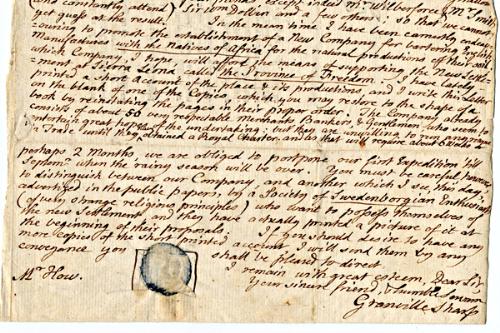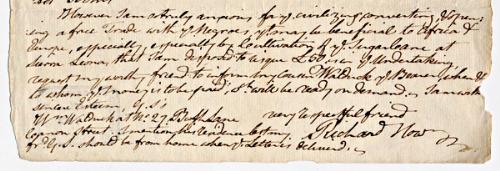Sierra Leone

This letter is from Granville Sharp of Leadenhall St, London to Richard How of Aspley Guise. it includes details about progress on work towards abolition of the slave trade; the new company for trading with the natives of Africa, and about the establishment of Sierra Leone. 17 Mar. 1790.
'Permit me to assure you, that my friendship and esteem for you are by no means to be measured or rated by the tardiness of my acknoweldgements for the favour of your very kind and obliging letters; and tho I am heartily ashamed of such delay (especially in answering a Gentleman to whom I wish to express a sincere respect) yet I really could not prevent it; for I have lived in such a state of continued interruption and hurry of late, that even the current business which could not be postponed has entirely engrossed my whole time, & almost totally excluded letter writing. I did not neglect, however, to communicate your last sensible letter (immediately on the receipt of it) to the Committee of the Society for effecting the Abolition of the Slave Trade, as the subject of it was on that point. We are all entirely of your sentiment that 'no Regulations will be effectual', nothing butthe entire Abolition. But our cause is violently opposed in Parliament, and the attendance of our adversaries in the Committee of Enquiry is far more assiduous and pertinatious than that of our friends except indeed Mr Wilberforce and Mr Smith (who constantly attend), Sir William Dolbin and a few others; so that we cannot yet guess at the result.
In the meantime I have been earnestly endeavouring to promote the establishment of a New Company for bartering English Manufactures with the natives of Africa for the natural productions of their soil, which Company, I hope, will afford the means of supporting the new settlement at Sierra Leona called the Province of Freedom. I have lately printed a short account of the place & its productionss and I write this letter on the blank of one of the copies, which you may restore to the shape of a book by reinstating the pages in their proper order. The Company already consists of about 50 very respectable merchant bankers & gentlemen, who seem to entertain great hopes of the undertaking; but they are unwilling to run any risque in Trade until they have obtained a Royal Charter, and as that will require about 6 weeks orperhaps two months, we are obliged to postpone our first expedition until September when the rainy season will be over. You must be careful, however, to distinguish between our Company and another which I see, this day, advertised in the public papers, by a Society of Swedenborgian Enthusiasts (of very strange rekligious principles) who want to possess themselves of the enw settlement, and they have actually printed a picture of it at the beginning of their proposals. If you shall desire to have any more copies of the short printed account I will send them by any conveyance you shall be pleased to direct.
I remain with great esteem, Dear Sir, your sincere friend & humble servant, Granville Sharp.'
[ref.HW87/428]
Richard How contributed £50, as his later correspondence to Granville Sharp in 1792 shows:

Aspley, April 7th 1792
'However, I am truly anxious for ye civilising, converting & opening a free trade with ye negroes, yt may be beneficial to Africa & Europe, especially by cultivating ye sugar cane at Sierra Leona, that I am disposed to risk £50 in ye undertaking, request my worthy friend to inform my cousin Walduck ye Bearer, when and to whom the money is to be paid, which will be ready on demand...'
Why are these documents at Bedfordshire & Luton Archives?
This letter is part of the collection of the How Family of Aspley Guise, deposited in the archives by the family between 1932 and 1964.
Granville Sharp (10 November 1735 – 6 July 1813) was one of the first English campaigners for the abolition of the slave trade. He also involved himself in trying to correct other social injustices. Sharp formulated the plan to settle blacks in Sierra Leone, and founded the St. George's Bay Company, a forerunner of the Sierra Leone Company. His efforts led to both the founding of the Province of Freedom, and later on Freetown, Sierra Leone, and so he is considered to be one of the founding fathers of Sierra Leone. He was also a biblical scholar and classicist, and a talented musician.[source: Wikipedia]